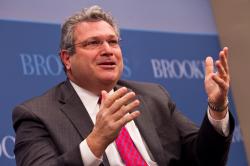

3:30 pm EDT - 5:00 pm EDT
Past Event
3:30 pm - 5:00 pm EDT
1775 Massachusetts Avenue N.W.
Washington, DC
20036
Since the end of World War II, the United States and Europe have promoted and led a global order built on mutual security alliances, multilateral institutions, and the open exchange of goods, ideas, and capital. This liberal order, along with the democratic values that underpin it, was widely recognized as the key driver of peace, prosperity, and freedom across the globe. And then 2016 happened. While dissatisfaction over globalization’s unequal returns and doubts over America’s global leadership were not new, the magnitude of their political impact was unprecedented. Voters in the United Kingdom, one of the wealthiest and largest members of the European Union, decided to withdraw. The American people elected a president highly critical of international alliances, free trade, immigration, interventionism, and other pillars of the global order. Across Europe, populist and nationalist parties surged by channeling rampant dissatisfaction with the status quo and perceptions that migration, globalization, and Brussels itself had overlooked the middle class.
Yet, despite the obituaries written on both sides of the Atlantic, in 2017 the West has endured. Donald Trump’s harsh campaign rhetoric against NATO and in favor of isolationism is being rewritten to accommodate the realities of governance. Dutch voters rejected the anti-immigrant, anti-EU candidates in their March election. In France, the electoral chances of the once-resurgent Marine Le Pen are increasingly slim. Europeans are also coming to view Brexit not as a harbinger for the demise of the EU, but as a crisis mostly for the U.K. But even if the worst does not come to pass for now—is the West’s survival truly assured?
On May 2, the Brookings Center on the United States and Europe, in partnership with the Heinrich Böll Foundation North America, hosted a panel discussion on the survival of the global liberal order. Speakers included Ralf Fücks of the Heinrich Böll Foundation and Robert Kagan and Constanze Stelzenmüller of Brookings. Brookings Fellow Thomas Wright moderated the discussion.



Sam Boocker, Alexander Conner, David Wessel
April 25, 2024
2024
The Brookings Institution, Washington DC
10:00 am - 11:15 am EDT

Constanze Stelzenmüller
April 22, 2024